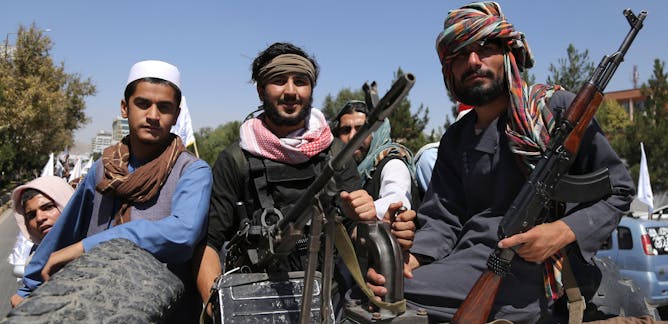
Articles on US withdrawal from Afghanistan
Displaying all articles

The Taliban is likely to be hoping for economic and political benefits from an improved relationship with Russia.

The Taliban’s two years ruling Afghanistan have taught us ordinary human rights initiatives are insufficient to address gender apartheid. We need resolute collective international action.

To prosper after the legacy of imperialism and colonization, Afghanistan needs partnerships and business investment, not bullets and bombs.

The problems of the withdrawal were clear in my experience trying to help Afghan researchers.

Even in the absence of a moral motive to alleviate famine, there is a strong rationale for the West to do whatever’s necessary to alleviate hunger in Afghanistan this winter.

As the West contemplates how to engage with the increasingly brutal Taliban government in Afghanistan, the country’s people will suffer enormously.

This summer’s disintegration of the Afghan government and continuing political turmoil in Iraq provide valuable lessons for the U.S. and its mission to impose democracy on the rest of the world.

How can we reconcile competing claims that colonialism of any kind is detrimental with the view that Afghanistan has been failed by the West?

North Korea has tended to ratchet up tensions when the U.S. is seen to be weak and when it feels it can yield greater concessions, a scholar explains.

In the aftermath of the U.S. withdrawal from Afghanistan, Russia looks like an increasingly desirable international partner across much of the globe.

The most important lesson from the US withdrawal from Afghanistan may be our failure to learn from history.

The potential failure of the US military to protect information that can identify Afghan citizens raises questions about whether and how biometric data should be collected in war zones.

The Afghan military’s collapse was the collective result of individual soldiers making rational decisions based on what they expected their comrades to do.

Culture change has been slow and difficult but the will to make life better for Afghan women was there. Now a big question mark hangs over their future.

Hanif Sufizada got caught in Kabul as the Taliban took over. A scholar and resident of the US who works at the University of Nebraska in Omaha, Sufizada describes his experience trying to leave.

It may be attractive to think that promoting democracy in occupied foreign countries is an appropriate moral and effective path for restoring security and stability. But it’s not accurate.

When the US invaded Afghanistan in late 2001, Afghans had endured 22 years of war. The Taliban were on the rise. Little has changed after an additional 20 years of war and suffering.

For much of the country’s history, Americans won their wars decisively, with the complete surrender of enemy forces and the home front’s perception of total victory.

A scholar and practitioner of foreign policy and national security offers personal and professional perspectives on the US withdrawal from Afghanistan.
